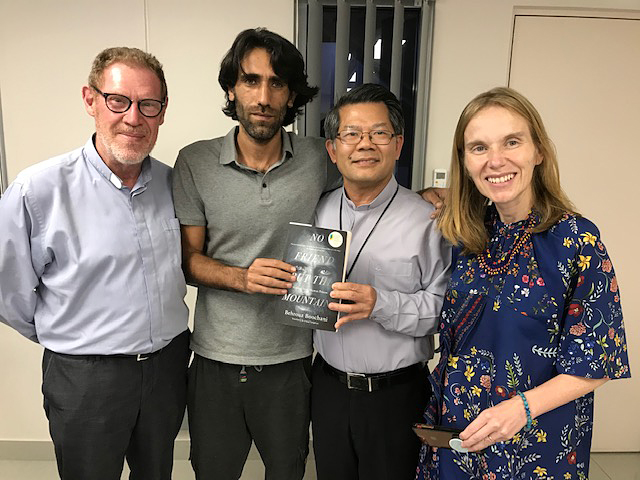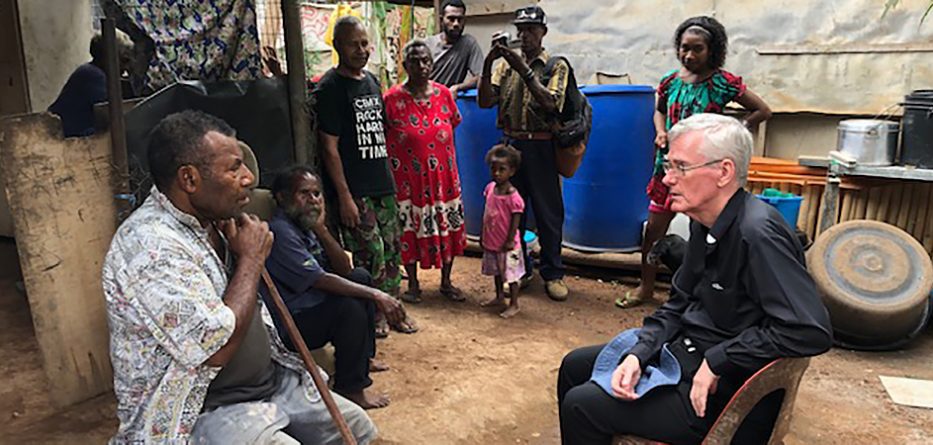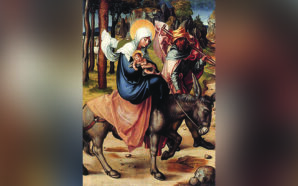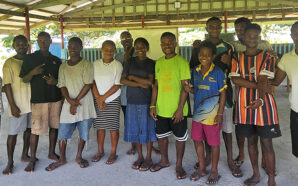A high-level Australian Catholic delegation has met with former Manus Island asylum seekers and refugees now in Port Moresby, and heard shocking stories of their detention.
“It was shameful to hear how our government has treated them on Manus Island and how some of them would feel safer in some totalitarian prison back home rather than what they had been subjected to,” Brisbane priest and delegation member Fr Gerry Hefferan said.
Fr Hefferan, parish priest at St Joseph’s and St Anthony’s, Bracken Ridge, also met with West Papuans who recently fled violence across the border, and now live in squalid camps in the Papua New Guinea capital.
“The water just drains in between the shacks on the dirt, there is one toilet for 50 families,” he said, pinpointing dysentery and malaria as the main health concerns.
He said there were about 14,000 West Papuans scattered in camps in Port Moresby and along the border region with Indonesia.
The Catholic Church in PNG and Caritas support the West Papuans, but greater funding from Australia was needed.
“We need to be there to help these West Papuans in exile, particularly those who are now stateless,” Fr Hefferan said.
Chairman of the Australian Catholic Bishops Conference Commission for Social Justice Parramatta Bishop Vincent Long headed the delegation that heard from asylum seekers including about 120 former Manus detainees transferred to Port Moresby in August.
“The Catholic Church in Australia and PNG have both previously called for a durable solution for those who have been taken by the Australian Government to PNG for processing,” Bishop Long said.
“Our visit has affirmed the necessity and urgency of finding this solution for all cohorts.”

Bishop Vincent Long (second right), Fr Peter Smith from the Justice and Peace Office in the Archdiocese of Sydney (left) and Carolina Gottardo, co-convener of CAPSA and Director of Jesuit Refugee Service (JRS Australia) (right) pose for a photograph with Kurdish journalist and refugee Behrouz Boochani. Image: Supplied.
Some of the former Manus detainees, amongst a larger group of about 320 asylum seekers, are being held in Port Moresby’s Bomana Prison complex.
Others are in guesthouses and lodgings until their cases are dealt with.
About 70 are on a pathway to resettlement in the United States and expect to fly out within weeks.
Another 25 or so are hoping for resettlement in Canada, under a private sponsorship scheme that costs $18,000 a person.
Another 10 have been approved for medical evacuation to Australia and are waiting anxiously to hear the fate of medevac laws, which the Australian Government hopes to repeal.
Inside Bomana Prison, Fr Hefferan said asylum seekers were kept in isolation and subjected to “mind games” that “really attack the spirit of the person”.
“Our delegation was able to speak to people recently released from Bomana – and you get released if you sign a paper that you’ll go back home,” he said.
“And one of the them (from the Bomana prison) thought it would be better in jail back in Iran, and whatever they do to him there, rather than what he had to do to survive in Bomana – so that’s why he signed the letter.”
Another delegation member Carolina Gottardo, who is co-convenor of the Catholic Alliance for People Seeking Asylum and director of Jesuit Refugee Service, said the situation around Bomana Prison “was highly alarming”.
“We were told that many men indefinitely detained in Bomana were experiencing conditions equivalent to torture – including not getting basic food and losing weight, being unable to contact family members and having no access to medication, legal advice or visitors,” she said.
“These men need to be out of Bomana as a matter of urgency.”
Promoter of Justice and Peace from the Sydney Archdiocese Fr Peter Smith said the group urged the Federal Government to take up New Zealand’s offer to resettle 150 refugees.
“We met with a number of men who have been determined as refugees but do not have secure futures – this could be resolved by Australia working with the New Zealand Government for a solution,” he said.
“We met with individuals who were accepted by the USA and Canada, through private sponsorship, for resettlement.
“The joyful difference in the demeanour of these people to the others who have no secure future at this stage was striking.”
The Australian delegation affirmed support for laws allowing the medical evacuation of refugees in offshore detention so they could be treated in Australia.
The Morrison Government was attempting to repeal medevac legislation even though doctors and refugee support groups backed the legislation.
“Why can’t medical opinion be the priority rather than political decisions and games and people voting in loyalty to their party, rather than (loyalty) to human rights issues,” Fr Hefferan said.
By Matt Emerick. Reproduced with permission from The Catholic Leader, the online news publication of the Archdiocese of Brisbane.








